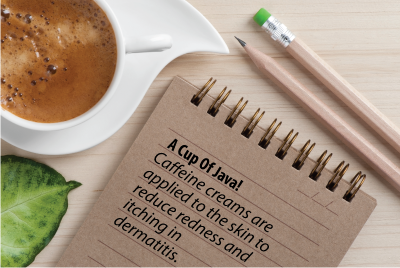Caffeine Uses, Side Effects, Interactions and Dosing….
Overview Information
Caffeine is a chemical found in coffee, tea, cola, guarana, mate, and other products.
Caffeine is most commonly used to improve mental alertness, but it has many other uses. Caffeine is used by mouth or rectally in combination with painkillers (such as aspirin and acetaminophen) and a chemical called ergotamine for treating migraine headaches. It is also used with painkillers for simple headaches and preventing and treating headaches after epidural anesthesia.
Some people use caffeine by mouth for asthma, gallbladder disease, attention deficit-hyperactivity disorder (ADHD), obsessive-compulsive disorder (OCD), low oxygen levels in the blood due to exercise, Parkinson’s disease, memory, cramping, liver cirrhosis, Hepatitis C, stroke, recovery after surgery, decreasing pain, muscle soreness from exercise, age-related mental impairment, shortness of breath in newborns, and low blood pressure. Caffeine is also used for weight loss and type 2 diabetes. Very high doses are used, often in combination with ephedrine, as an alternative to illegal stimulants.

Caffeine is one of the most commonly used stimulants among athletes. Taking caffeine, within limits, is allowed by the National Collegiate Athletic Association (NCAA). Urine concentrations over 15 mcg/mL are prohibited. It takes most people about 8 cups of coffee providing 100 mg/cup to reach this urine concentration.
Some caffeine products are sold in very concentrated or pure forms. These products are a health concern. People can easily use these products in doses that are much too high by mistake. This can lead to death. As of 2018, the U.S. Food and Drug Administration (FDA) considers it unlawful for these products to be sold to consumers in bulk.
Caffeine creams are applied to the skin to reduce redness and itching in dermatitis.
Healthcare providers sometimes give caffeine intravenously (by IV) for headache after epidural anesthesia, breathing problems in newborns, and to increase urine flow.
In foods, caffeine is used as an ingredient in soft drinks, energy drinks, and other beverages.
People with voice disorders, singers, and other voice professionals are often advised against using caffeine. However, until recently, this recommendation was based only on hearsay. Now developing research seems to indicate that caffeine may actually harm voice quality. But further study is necessary to confirm these early findings.
READ MORE caffeine
Need more information?
Take care of your legacy , incase you become disabled or unable to advocate for yourself.
Sign Up Now… It’s Your Legacy and It’s Free!
Have questions? visit theripregistry.ca



Leave a Reply